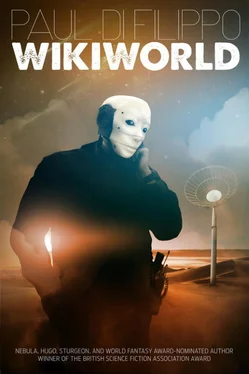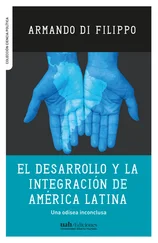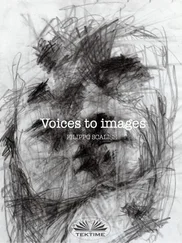Paul Di Filippo - WikiWorld
Здесь есть возможность читать онлайн «Paul Di Filippo - WikiWorld» весь текст электронной книги совершенно бесплатно (целиком полную версию без сокращений). В некоторых случаях можно слушать аудио, скачать через торрент в формате fb2 и присутствует краткое содержание. Город: Toronto, Год выпуска: 2013, ISBN: 2013, Издательство: ChiZine Publications, Жанр: Фантастика и фэнтези, на английском языке. Описание произведения, (предисловие) а так же отзывы посетителей доступны на портале библиотеки ЛибКат.
- Название:WikiWorld
- Автор:
- Издательство:ChiZine Publications
- Жанр:
- Год:2013
- Город:Toronto
- ISBN:978-1771481557
- Рейтинг книги:4 / 5. Голосов: 1
-
Избранное:Добавить в избранное
- Отзывы:
-
Ваша оценка:
- 80
- 1
- 2
- 3
- 4
- 5
WikiWorld: краткое содержание, описание и аннотация
Предлагаем к чтению аннотацию, описание, краткое содержание или предисловие (зависит от того, что написал сам автор книги «WikiWorld»). Если вы не нашли необходимую информацию о книге — напишите в комментариях, мы постараемся отыскать её.
WikiWorld — читать онлайн бесплатно полную книгу (весь текст) целиком
Ниже представлен текст книги, разбитый по страницам. Система сохранения места последней прочитанной страницы, позволяет с удобством читать онлайн бесплатно книгу «WikiWorld», без необходимости каждый раз заново искать на чём Вы остановились. Поставьте закладку, и сможете в любой момент перейти на страницу, на которой закончили чтение.
Интервал:
Закладка:
Tug pondered the possibilities. A radical recasting of his existence, new people, new circumstances…. Life on a houseboat, rent-free. The romantic, history-soaked vista of the Attawandaron Canal. Currier & Ives engravings of grassy towpath, overhanging willow trees, merry bargemen singing as they hefted bales and crates—
“I’ll do it! Thanks, Pete!”
But Pieter had already lost interest in Tug and his plight, the Dikelander’s Shepherdess-transmogrified proleptic attention directed elsewhere. “Yeah, cool, great.”
Tug helped his hazey-dazey friend stand and don his coat. They headed toward the exit.
Pieter stopped suddenly short and goggled in amazement at nothing visible to Tug. Other customers strained to see whatever had so potently transfixed the Dikelander.
“A Nubian! I see a Nubian princess! She’s here, here in Carrollboro!”
“A Nubian princess? You mean, like a black woman? From Africa?”
“Yes!”
Tug scratched his head. “What would a black woman be doing in Carrollboro? I’ve never seen one here in my whole life, have you?”
5. MOVING DAY MORN
After his impulsive decision at the Hatch Suit Nook—a decision to abandon all his old ways for a footloose lifestyle—Tug had nervous second thoughts. So in the two weeks left until his scheduled eviction on November first, he searched for a new job. But the surge of competing talented shorebirds made slots sparse.
Tug’s best chance, he thought, had come at the Aristo Nodak Company. That large, long-established national firm, purveyor of all things photographic, ran a film archive and theatre, mounting retrospective festivals of classic features, everything from Hollywood spectacles such as Elizabeth Taylor’s Salammbô to indie productions like Carolee Schneemann’s avant-garde home movies of the 1960s, featuring her hillbilly-skiffle-playing husband John Lennon. With their emphasis on old-school materials, there’d be no nonsense about Cinemeccanica o-500’s. But despite a sympathetic and well-carried interview, Tug had come in second for the lone projectionist job to a Brit shorebird who had worked for the drowned Elstree Studios.
Despondent at the first rejection, Tug had immediately quit looking. That was how he always reacted, he ruefully acknowledged. One blow, and he was down for the count. Take his only serious adult romantic relationship, with Olive. The disintegration of that affair a few years ago had left him entirely hors de combat on the fields of Venus.
But what could he do now about this fatal trait? He was too damn old to change….
Tug didn’t own a fancy o-phone or even a cheap laptop ordinateur. The hard drive on his old desktop model had cratered a year ago, and he had been too broke to replace the machine. Consequently, he used a local o-café, The Happy Applet, to manage his sparse o-mail and to surf CERN-space. A week before his scheduled eviction, he went to Craig’s List and posted a plea for help with getting his possessions over to the Little Theatre. Too proud and ashamed to approach his friends directly, Tug hoped that at least one or two people would show up.
Far from that meagre attendance, he got a massive turnout.
The morning of October 31 stdawned bright, crisp and white as Jack Frost’s bedsheets, thanks to an early dusting of snow. (The altered climate had pushed the typical wintry autumn weather of Tug’s youth back into December, and he regarded this rare October snow, however transitory, as a good omen.) After abandoning his futile job search, Tug had furiously boxed all his treasured possessions, donating quite a bit to Goodfaith Industries. Handling all the accumulated wrack of thirty years left him simultaneously depressed and nostalgic. He had set aside a smattering of essential clothes, toiletries and touchstones, stuffing them all into a beat-up North Face backpack resurrected from deep within a closet, token of his quondam affiliation with a hiking club out near Palmyra.
At six A.M. he sat on a box at a window looking down at Patrician Street, backpack nestled between his feet, sipping a takeout coffee. An hour later, just when he had prematurely convinced himself no one was coming, the caravan arrived: miscellaneous trucks and cars to the number of a dozen. Out of them tumbled sleepy-eyed friends, acquaintances and strangers.
Jeff, Dave, Pavel and Pieter from the Little Theatre. Tug’s second cousin, Nick, all the way from Bisonville. Brenda and Irene, baristas from The Happy Applet. Those nerdy guys with whom for a few years he had traded holo transects of rare Salmagundi Circuit novelty tunes. The kid who sold him his deli lunch each day and who had had an obsession with Helen Gahagan ever since Tug had introduced the kid to her performance in The Girl in the Golden Atom . And others, of deeper or shallower intimacy.
Including—yes, that fireplug of a figure was indeed Olive Ridley.
6. OLD HABITS DIE HARD
Tug hastened down the stairs, and was greeted with loud acclamations. Smiling broadly yet a bit nervously at this unexpected testament to his social connectivity, he nodded to Olive but made no big deal of her presence. Someone pressed a jelly doughnut and a fresh coffee into his hands, and he scarfed them down. Then the exodus began in earnest.
The first sweaty shuttling delivered nearly half his stuff to the basement of the old movie palace. Then came a refreshment break, with everyone gently ribbing Tug about this sea-change in his staid life, and subtly expressing their concern for his future, expressions he made light of, despite his own doubts. The second transfer netted everything out of the melancholy, gone-ghostly apartment except about a dozen small boxes. These were loaded into a single car. Sandwiches and pizza and drinks made the rounds, and a final salvo of noontide farewells.
Then Tug was left alone with Olive, whose car, he finally realized, bore the last of his freight.
But before he could expostulate, Narcisse Godbout arrived on the scene in his battered Burroughs Econoline van.
Born some seventy years ago in Montreal, the fat, grizzled, foul-mouthed Kewbie wore his usual crappy cardigan over flannel shirt, stained grey wool pants and scuffed brogans. Although resident in Carrollboro for longer than his Montreal upbringing, he had never lost his accent. For thirty years he had been Tug’s landlord, a semi-distant albeit intermittently thorny source of irritation. Godbout’s reasonable rents had been counterbalanced by his sloth, derision and ham-handed repairs. To preserve his below-market rent, Tug had always been forced to placate and curry the man’s curmudgeonly opinions. And now, of course, with his decision to evict Tug, Godbout had shifted the balance of his reputation to that of extremely inutile slime.
“You got dose fucking keys, eh, Gingerella?”
Tug experienced a wave of violent humiliation, the culmination of three decades of kowtowing and forelock-tugging. He dug the apartment keys from his pocket and threw them at Godbout’s feet into the slush. Then Tug summoned up the worst insult he could imagine.
“You—you latifundian !”
Yes, it fit. Like some peon labouring without rights or privileges for the high-hatted owner of some Brazilian plantation, Tug had been subservient to the economic might of this property-owner for too long. But now he was free!
Tug’s brilliant insult, however, failed to register with Godbout or faze the ignorant fellow. Grunting, he stooped for the keys, and for a moment Tug expected him to have a heart attack. But such perfect justice was not in the cards. An unrepentant Godbout merely said, “Now I get a better class of tenant, me. Good goddamn riddance to all you boho dogshits.”
The landlord drove off before Tug could formulate a comeback.
Читать дальшеИнтервал:
Закладка:
Похожие книги на «WikiWorld»
Представляем Вашему вниманию похожие книги на «WikiWorld» списком для выбора. Мы отобрали схожую по названию и смыслу литературу в надежде предоставить читателям больше вариантов отыскать новые, интересные, ещё непрочитанные произведения.
Обсуждение, отзывы о книге «WikiWorld» и просто собственные мнения читателей. Оставьте ваши комментарии, напишите, что Вы думаете о произведении, его смысле или главных героях. Укажите что конкретно понравилось, а что нет, и почему Вы так считаете.










